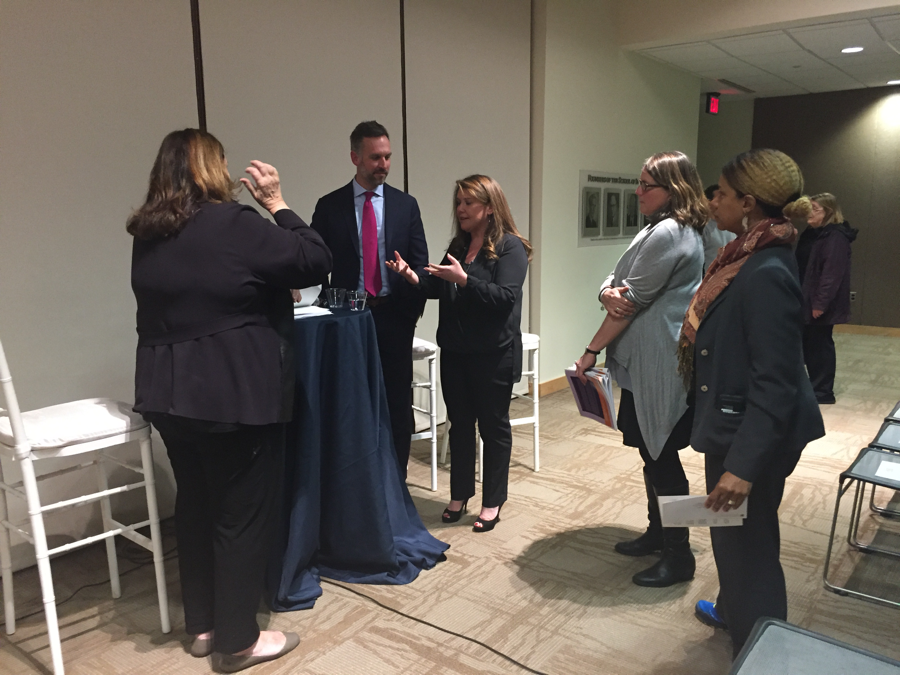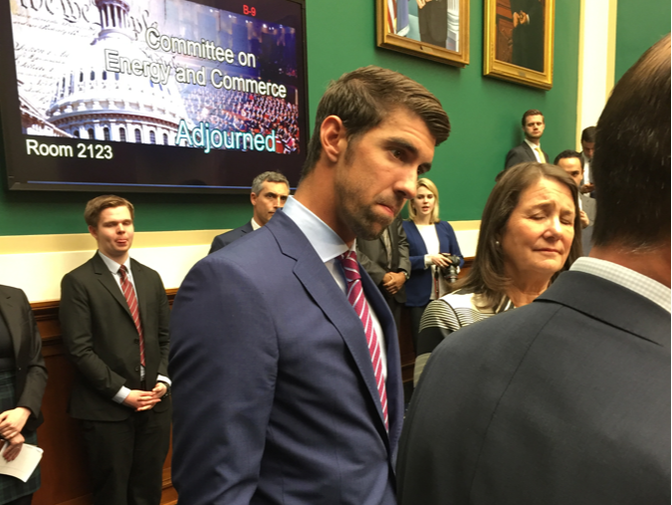|
By Aubrey Gelpieryn
American University WASHINGTON – Jennifer Lawless spent her younger years planning a run for political office. When that didn’t pan out, she decided to dedicate her life to helping other women achieve that dream. Lawless said she had an interest in politics from a young age and always knew that she would run for office; in 2006, she did. She lost the primary campaign for the House of Representatives, but still did much better than local media outlet anticipated. A popular incumbent in Rhode Island ran against her, and while estimates claimed she’d only win 10 percent of the vote, she won almost four times that. “I spoke to people that I wouldn’t normally speak to,” said Lawless. “I heard about peoples’ problems and concerns, and I was able to, I think, really become a more empathetic, compassionate person because you understand the struggles that people are going through on a day-to-day basis.” It was Lawless’ real-life political campaign experience that really opened her eyes to how women are treated in politics and put her in a role where she could bridge the practical with the academic aspects of political leadership. Since the fall of 2009, Lawless has served as the director for the Women and Politics Institute at American University, a role that allows her to work with a bi-partisan team to encourage women to develop and follow their own political ambitiond. “The two research questions that I’m most interested in are why don’t women run, and what happens when they do,” said Lawless, who added that the answers to those questions are the same on both sides of the political aisle. “It’s nice to be in the rare position … of being able to talk to people, whether they’re Democrats or Republicans, and share research findings that resonate with them and apply.” Her research has found that the main inhibitor of women running for political office is that they believe they had to be twice as qualified as men in order to run, which studies have proven to be untrue. Along with being the director for the Women and Politics Institute, Lawless teaches classes on the subject at American. These classes tend to attract a variety of students, with ranging political views, genders and beliefs. Ryan Guerra, a junior at American, is one of Lawless’ students. He said he’s learned a lot about how political ideology is a more prevailing factor than gender in politics. He decided to sign up for her class this semester because he was curious to know more about the roles of women in politics following the 2016 presidential election. “I think it’s interesting, and I like when she talks about her running,” said Guerra. “She talks about it with a lot of passion.” Lawless is in the process of publishing her next book with Richard L. Fox, “Women and Men in U.S. Politics: 10 Big Questions,” which will be released in the fall and discusses how gender and politics plays a role in the everyday lives of people as well as in politics. Lawless has published five books so far. Her most recent is “Women on the Run: Gender, Media, and Political Campaigns in a Polarized Era,” which is co-authored by Danny Hayes, an associate professor of political science at The George Washington University. “The book is an attempt to figure out whether women really do have to be twice as good, and the good news is they face a pretty level playing field from the moment they announce until the votes are counted,” said Lawless. Hayes and Lawless met when he worked at American. They both were interested in women and politics, and after having some conversations on the topic, decided to co-author a book. “Anyone who has worked with Jen would describe her as a force of nature. She has a capacity to get more things done in a day than most people can accomplish in a week,” said Hayes. Hayes said that before their collaboration, there hadn’t been research conducted on what it looks like when women run for office for a few decades, and the two of them were excited to update it. Even though she stays busy inspiring other women to recognize their political ambition, don’t discount Lawless’ own potential for a return to politics. “Like I always say, I have no plans to run, but I hope to at some point in the future,” she said.
0 Comments
By Aubrey Gelpieryn
American University WASHINGTON – Michael Phelps sat before the House Subcommittee on Oversight and Investigations Tuesday morning and told the Representatives that he didn’t think he’d ever participated in a “clean” Olympic Games. Phelps, who retired from swimming after winning his 28th medal in the Rio de Janeiro Games this past summer, shared a personal testimony of his experiences having known other athletes were using drugs to gain a competitive advantage. Though he had previously avoided talking about the subject, Phelps said that his newborn son is what inspired him to finally step forward and share his criticism of performance-enhancing drugs and why he never felt the need to partake in doping. “I put my body through pain that I’ll never see again, trust me. But it just needs to be fair,” said Phelps. For me, having a son, I want him to enjoy clean, fair sport.” A panel of witnesses, that included shot-putter and Olympic gold medalist Adam Nelson, United States Anti-Doping Agency Chief Executive Officer Travis Tygart, World Anti-Doping Agency Deputy Director General Rob Koehler and IOC Medical and Scientific Director Dr. Richard Budgett, joined Phelps as witnesses. The subject of anti-doping was particularly personal for Nelson. He was awarded his gold medal nine years after competing in the Olympics, when it was revealed that the competitor who had bested him did so with the assistance of performance-enhancing drugs. His gold medal, which he showed to the members of congress, was not given to him on the Olympic podium, but in an airport food court. After talking to congress, Nelson was ready for action to take place. “I think the first next step is for the IOC and WADA to actually follow up on what they talked about today. The fact that the IOC representative said that they’re going to consider separating sport from this particular element is a really big step,” said Nelson. “I’ve had the opportunity to represent my country in competitions all over the world, but to have the opportunity to come and represent clean sports in this particular venue is an element that you just don’t get to do very often.” Nelson said he hopes that “major changes” will result from this hearing. Subcommittee Chairman Rep. Tim Murphy. R-PA., said the hearing was important because it sent a message to American youths. “Sports should be a place where your determination and your skill, your focus, your psychosocial makeup are things that are the difference between a champion and just a competer,” said Murphy “Drugs should not be a part of it.” The topic of anti-dopoing is especially relevant after this past summer’s Olympics, during which time 68 Russian athletes were banned from competing due to positive tests, according to the BBC. Phelps described this incident as “frustrating.” He said that while he was tested 13 times in the six months leading up to the 2016 Games, sometimes being woken up at 6 a.m. on his off days to complete a test, athletes from other countries were allowed to participate even after testing positive twice. |
Aubrey GelpierynAubrey Gelpieryn is a journalist currently in New York. She enjoys writing about music, politics and current events. Archives
January 2021
Categories
All
|



 RSS Feed
RSS Feed